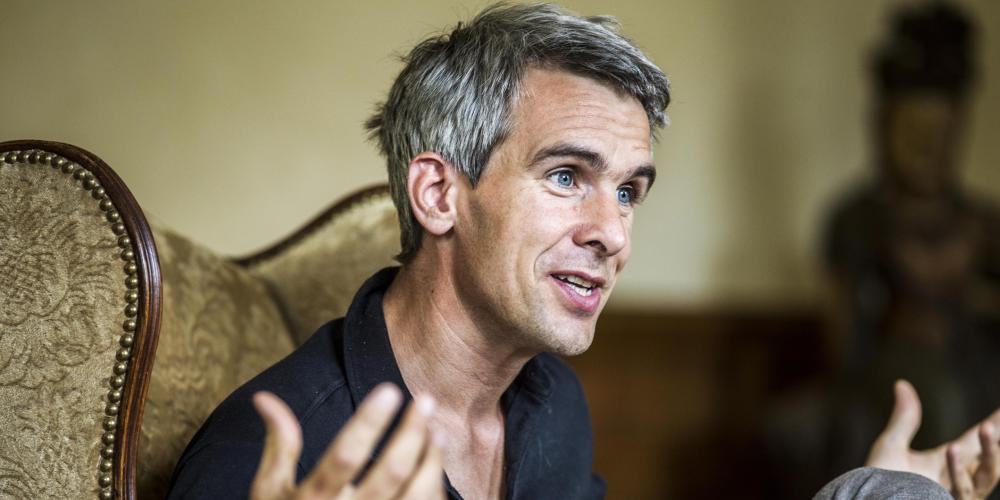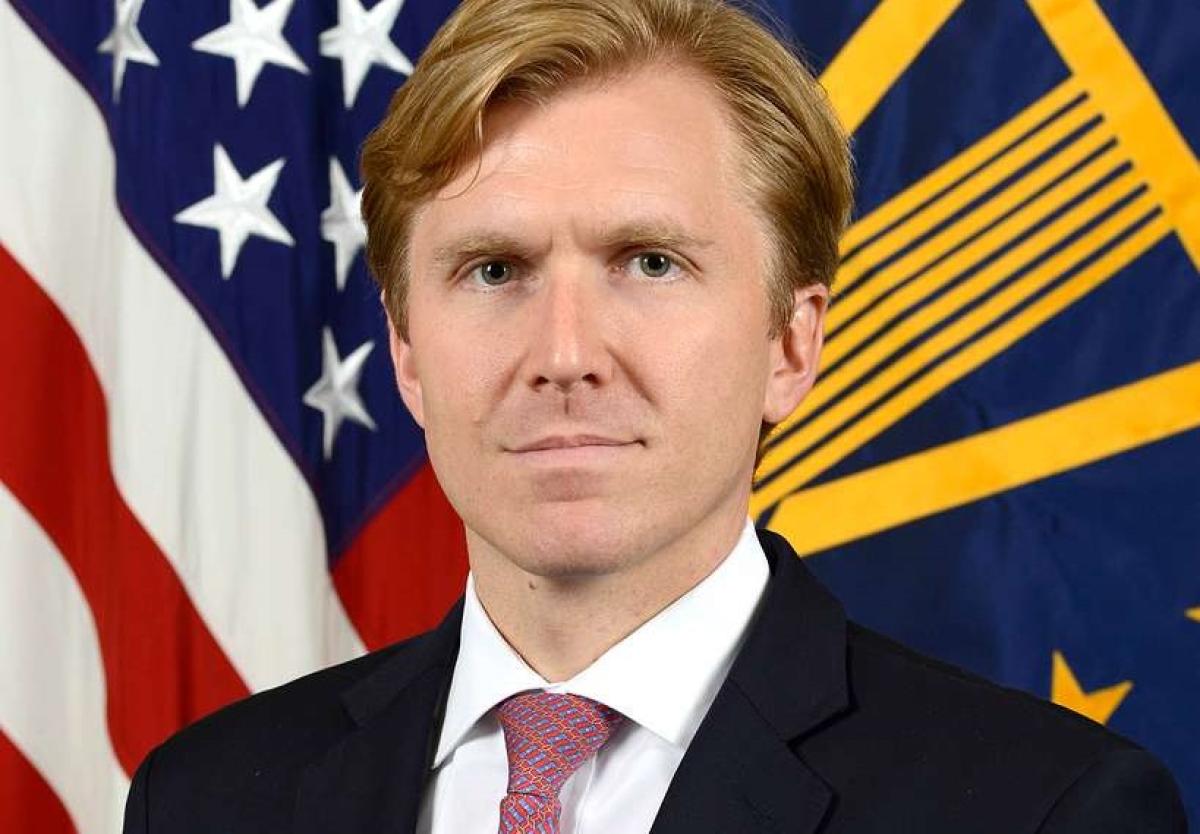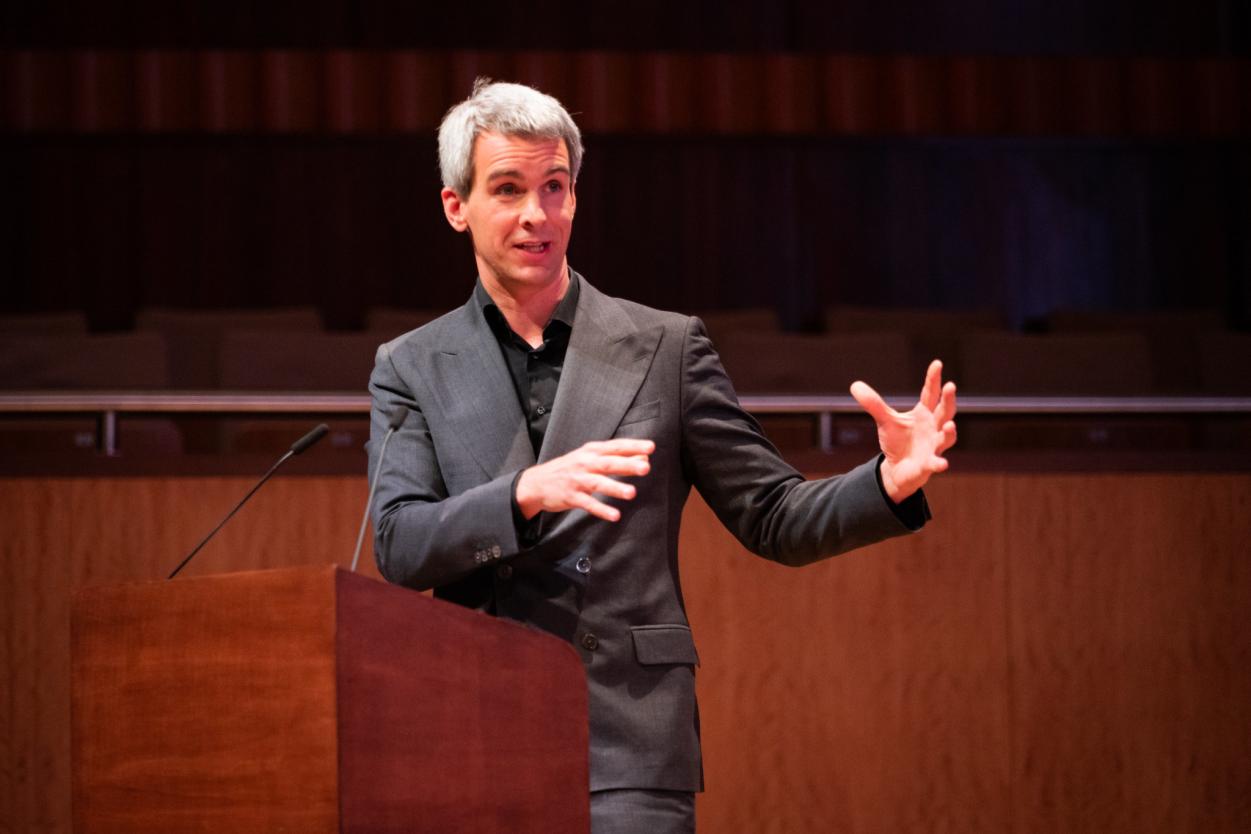
Remaining the world’s strongest power: this, according to Elbridge Colby, is the best way to ensure the safety of the United States. The influential American defence expert argues that China must be the country’s top priority. Europe, meanwhile, needs to fend for itself. On 16 October, Colby will explain his views to an audience at the invitation of VUB professor Jonathan Holslag.
Giants at the Crossroads: China and the United States
Tensions between China and the United States continue to rise. Where does the mistrust between these two nations stem from? How does this mistrust influence American strategic, economic, and security decisions? And what does the shaky relationship between these two global powers mean for security in Europe?
Wednesday, 16 October 2024, 7 PM, KBR, Brussels
Elbridge Colby has Donald Trump’s ear – at least when it comes to China. For two years during Trump’s presidency, Colby served as Deputy Assistant Secretary of Defense for Strategy and Force Development. He is also closely involved in the Conservatives’ China policy in the ongoing election campaign. “Elbridge Colby belongs to the ‘China hawks’,” Jonathan Holslag explains. “You can agree or disagree with their hardline stance, but it’s crucial to understand their motives and plans. After all, America’s China policy will have a significant impact on Europe too.”
What is Elbridge Colby’s vision?
Jonathan Holslag: “It’s straightforward: America must remain number one, globally. But the focus is now entirely shifting towards the main rival, China. The US must weaken the industrial foundation of Chinese power through a strong trade policy and by reindustrialising itself. In terms of defence, the US also needs to ramp up its efforts.”
Isn’t the country far ahead in terms of military power?
“Not anymore. For instance, China’s shipbuilding capacity is hundreds of times greater than that of the US, and can quickly be used to build military ships. They’ve had the quantity for some time, and now the quality has caught up as well. It’s no longer inferior to what’s produced by a Western shipyard. And with their drones and other unmanned systems, China is already far ahead.”
Does this worry the Americans?
“Yes, a lot. During the Cold War, they still had the industrial capacity to quickly catch up. That’s no longer the case today. Attempts to modernise their navy are facing significant delays due to a shortage of shipyards and skilled workers. President Joe Biden’s plans to build complex factories for computer chips are encountering similar issues: too few engineers, too few skilled workers.”
So they won’t be able to turn this around overnight?
“In the best-case scenario, they might reverse the trend by 2030. This is partly due to the extremely costly global ‘war on terror’ and the neglect of parts of the military-industrial base.”
“The Americans need all their energy and resources for Asia. If Russia becomes a threat to the Baltic states or Poland, the Europeans will have to handle that themselves”
Yet China is also facing economic challenges, isn’t it?
“When you look at the past 30 years, you see a spectacular shift in power from the West to the East. America lost ground and China gained power. More recently, we’ve reached a stalemate. China is struggling with its own economic challenges and the Americans are taking the first steps towards reindustrialisation. It’s hard to predict who will come out on top.”
So, there is reason for Colby to focus militarily on Asia. How does he plan to keep China in check?
“By building military capacity in the Pacific, but from a distance. Other American defence experts advocate for a permanent presence in the first island chain, close to Japan and Taiwan. Colby doesn’t think that’s a good idea and prefers to station troops on the second island chain, further east. The centre of this strategy, the island of Guam, is American territory. That means American forces won’t get too entangled in potential conflicts, for example between China and Taiwan, but they’ll be close enough to intervene with missiles and drones.”

Elbridge Colby
What does this mean for allies in the region?
“The Americans are helping Taiwan, Japan, the Philippines and Australia to strengthen themselves politically, economically and militarily. Taiwan is becoming a ‘porcupine’. In the event of an attack, it should keep China busy long enough for the US to intervene.”
What about Europe?
“According to Colby, we need to learn to stand on our own two feet, in military terms. The Americans need all their energy and resources for Asia. If Russia becomes a threat to the Baltic states or Poland, the Europeans will have to handle it themselves. This is why Republicans are advocating for a quick peace deal with Russia. That would create a new balance in Europe and free them up to focus on Asia.”
Is Colby right that Europe needs to stand on its own?
“I agree with him on that point. Despite all the promises, Europe has failed to re-establish itself as a major geopolitical player. We’ve only become more dependent on America and China. In a way, we’re bringing this on ourselves.”
Colby says military build-up can be economically beneficial. How so?
“Many middle-class Americans are worried about their purchasing power but see that enormous amounts of money are being spent on defence. Colby’s message, and by extension Trump’s, is that investing in weapons is good for security and creates jobs. The same, he argues, applies to Europe, which should also invest more in defence.”
“We’re moving towards a world where tough nationalist thinkers like Colby are taking charge instead of the traditional liberal thinkers in Europe”
There’s a consensus among Republicans about focusing on China. What about the Democrats?
“They largely think the same. Like Colby, they support military build-up in East Asia, but from a distance, and they want to help Taiwan, Japan, the Philippines and Australia arm themselves. They, too, want to curb China’s economic power and rebuild industry at home. The difference with Trump is that he wants to impose hefty tariffs on Chinese imports – a sledgehammer approach, so to speak. The Democrats want the same, but they’re using a finer scalpel.”
Does it make much difference for Europe whether Kamala Harris or Donald Trump wins the election?
“Not as much as some might think. In military terms, Biden has been committed to Europe with his support for Ukraine. But his protectionist Inflation Reduction Act, a massive subsidy pot for companies investing in clean energy in America, is hurting the European economy. For the Democrats, too, it’s ‘America first’. But it’s the same in China, India, Turkey... We’re moving towards a world where tough nationalist thinkers like Colby are taking charge instead of the traditional liberal thinkers in Europe.”
Will Europe’s ‘soft power’ give way to more realpolitik?
“European Commission president Ursula von der Leyen now acknowledges the importance of strategic autonomy. And she describes China in clear terms as a strategic rival. There’s a growing realisation that soft power cannot exist without hard military power. Otherwise, we’ll become too dependent on other power blocs.”
Is this a call for a European army?
“In an ideal world, we’d become something like the United States of Europe, with greater military cooperation. But the barriers between languages, cultures and geopolitical orientations are enormous. I fear the opposite is happening. EU member states are becoming more suspicious of each other and sovereignty is increasing. Perhaps the peak of European unity is already behind us.”
Yet most Europeans would favour a strong joint foreign policy and more defence cooperation, wouldn’t they?
“That’s true. But in the voting booth, they still choose something else.”

Jonathan Holslag
The world needs you
This initiative is part of VUB's public programme, a programme for everyone who believes that scientific knowledge, critical thinking and dialogue are an important first step to create impact in the world.
As an Urban Engaged University, VUB aims to be a driver of change in the world. With our academic edcuational programmes and innovative research, we contribute to the Sustainable Development Goals of the United Nations and to making a difference locally and globally.